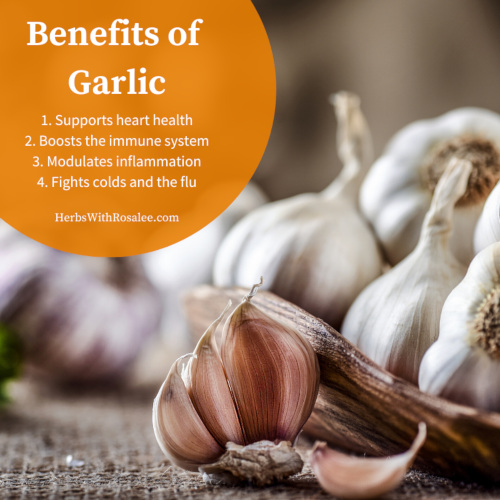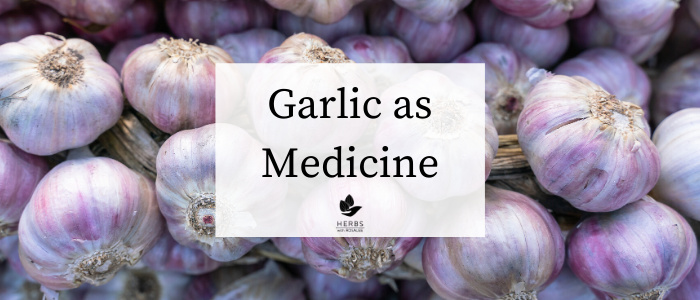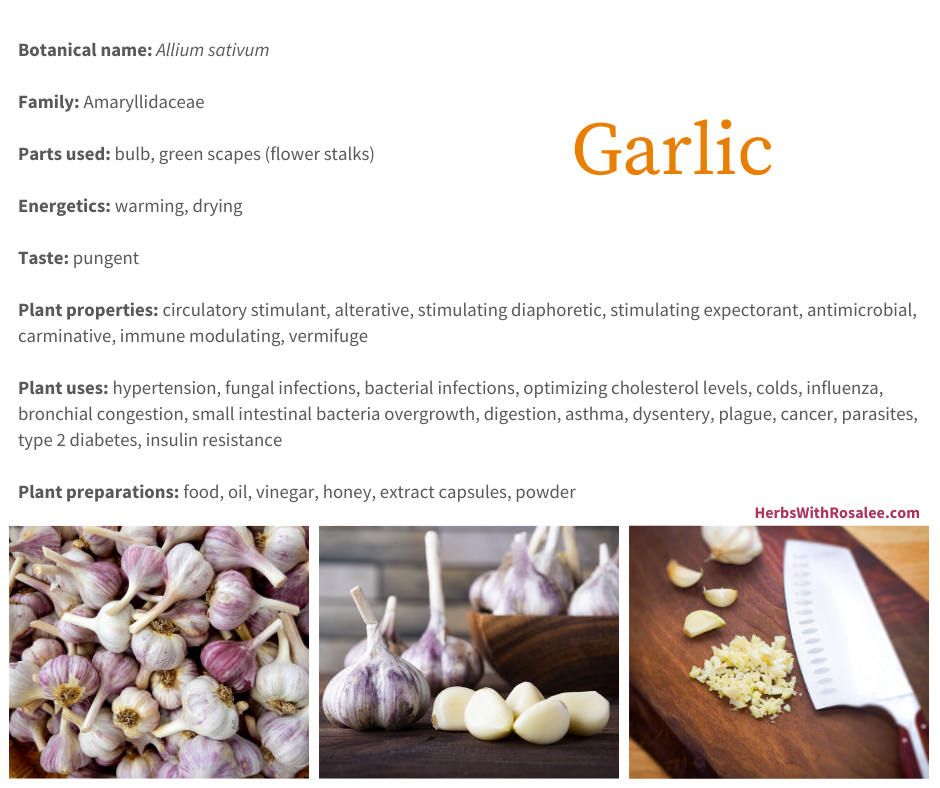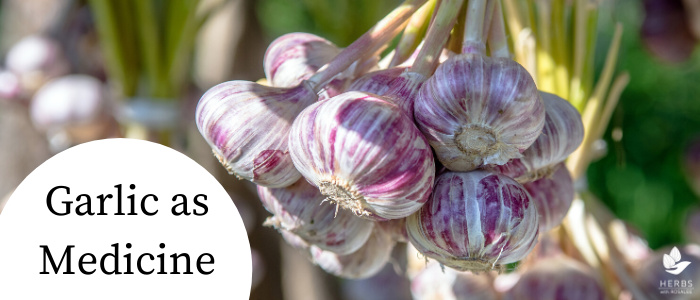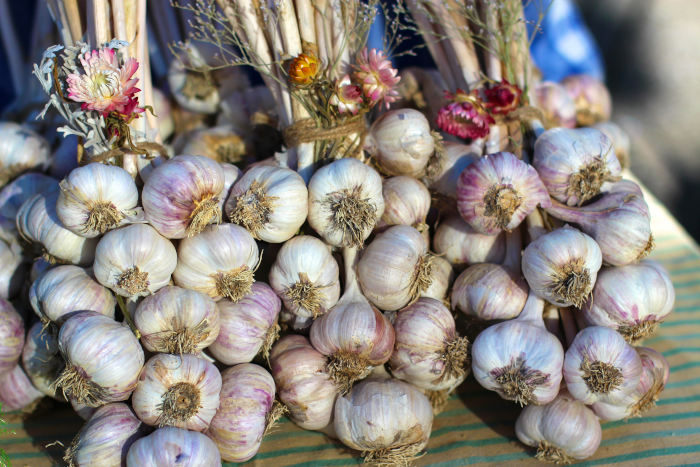Get weekly tips, recipes, and my Herbal Jumpstart e-course! Sign up for free today.

Is Garlic Good for You?
Share this! |
|
Is garlic good for you? For thousands of years people have relied on garlic to keep infections at bay, increase energy, support the heart, and flavor their food. Humans have been cultivating garlic for so long that we aren’t even entirely sure where and when the first cultivation practices began. Perhaps Asia or ancient Persia? Sumerian clay tablets written almost 5,000 years ago reference the medicinal and edible properties of garlic and we know that it was used as medicine in ancient Egypt and Greece.
Garlic is an amazing herb that adds evocative flavor to your food while also providing many medicinal gifts. Herbalists commonly use garlic for symptoms of upper respiratory infections, as a general antimicrobial, and to support both heart health and digestion. And the best part is that fresh garlic can be readily found at your local grocery store or farmer’s market. It’s also really easy to grow in temperate climates!
Garlic is potently pungent and spicy. If you are unaccustomed to eating it raw, simply chewing one little clove can be a very intense experience. The taste and aromatics fill not only your mouth, but also your sinuses. When used this way there’s no denying that garlic has a powerful effect. Because garlic is so hot, spicy, and pungent, it is best used for cold and stagnant conditions. In this way, its hot and stimulating nature can warm things up and move stagnation along.
Is Garlic Good for You?... Garlic for Colds and the Flu
Regularly eating garlic can help prevent you from getting sick. And it’s not just because you smell like garlic and are keeping people at bay!
One clinical trial compared how many upper respiratory infections were contracted in three groups of children. In one group, the children were taking long-releasing garlic extract while another group of children were taking a pharmaceutical drug that was designed to inhibit upper respiratory infections. There was also a control group taking a placebo. Those taking the garlic had a two- to fourfold reduction in sickness compared with both the control group and those taking the pharmaceutical.1
If you already have a cold or flu, garlic is one of the best all-around herbs for addressing the many symptoms of an upper respiratory infection. The smell of garlic on your breath is a good sign…it means that garlic’s volatile oils are coming out through your lungs, which is exactly where you want garlic to provide its antimicrobial activity.
Taken at the onset of an illness, raw garlic may help to shorten the duration of illness. The antimicrobial action of raw garlic can also address a sore throat (combine it with honey or oil for best results). When taken during an illness, it’s also been shown to reduce the severity of symptoms.2
Garlic is a stimulating diaphoretic, which helps the body to warm up and support the fever process. This is best when someone feels cold or is having chills.
Garlic especially shines at relieving congestion, whether in the lungs or the sinuses. Raw garlic is spicy and stimulates mucus flow, while also helping to thin and expel it from the body. This is effective both when using it internally or externally as an infused oil, such as being rubbed on the chest or feet.
And if the congestion is in your ears, garlic-infused oil is commonly used to address ear infections. It can be used on its own or combined with mullein flowers. The infused oil is slightly warmed and a drop or two placed in the sore ear canal.
Is Garlic Good for You?... Garlic Inhibits Pathogens and Increases Immune Function
Garlic has long been used for its antimicrobial properties. Historically, garlic was used to prevent infections in wounds and even to dispel the Bubonic plague, a type of bacterial infection.
Herbalist Paul Bergner describes its use in the 20th century in his book The Healing Power of Garlic: “During World War I, garlic poultices were used for the wounds of soldiers in Europe...Garlic oil was diluted with water, put on swabs of sterilized moss, and applied directly to the wounds. The lives and limbs of tens of thousands of soldiers were saved in this way.”3
There have been countless in vitro studies looking at the antimicrobial properties of garlic. In these studies garlic has been shown to be effective against Escherichia coli, Helicobacter pylori, Staphylococcus aureus, Candida albicans, methicillin-resistant Staphylococcus aureus (MRSA), Shigella spp., Salmonella spp., Proteus mirabilis, and Porphyromonas gingivalis.4,5,6,7
It’s important to note that in vitro studies can never be directly extrapolated to how it will work in humans. However, the combined weight of historical use, modern day experiences, and in vitro studies all says the same thing: Garlic is antimicrobial against a wide range of pathogens including bacteria, fungi, and amoebas.
Because it is renowned for its antimicrobial abilities, garlic is sometimes mistakenly called an herbal antibiotic. The term “antibiotic” means anti-life and is used to describe pharmaceuticals that indiscriminately kill all bacteria they come into contact with. While garlic has a significant effect against many pathogens, you would have to eat an incredible amount of it to kill healthy gut bacteria found in your digestive tract. In fact, garlic actually provides (prebiotic) food that supports a healthy gut flora.
Garlic also does something that pharmaceutical antibiotics never do! Garlic can increase your immune system activity. Studies have shown that it increases the natural killer cells of the immune system and reduces inflammatory cytokines (chemical messengers of the immune system).8
Is Garlic Good for You?... Garlic and Cancer
Garlic’s ability to stimulate the immune system has made it of interest to anti-cancer researchers. Many in vitro studies have shown that garlic can inhibit cancer and stimulate apoptosis in several different kinds of cancer, including breast, prostate, and lung cancer.9 Again, we can’t assume that what happens in a petri dish (in vitro) is what happens within the human body (in vivo).
Yet one clinical trial has shown some potential. This study looked at people diagnosed with inoperable colorectal, liver, or pancreatic cancer. Half of the volunteers were given a placebo and the other half were given aged garlic extract. After six months, those receiving the garlic had increased immune system activity, including an increase in natural killer cells and an
increase in natural killer cell activity.10
Another trial looked at how eating raw garlic effected people’s genes. The conclusion was that “Seven genes related to immunity and/or cancer were upregulated in whole blood 3 h[ours] after [garlic] consumption. The upregulated genes have a variety of functions, including roles in xenobiotic metabolism, inflammation, B cell and T cell development, apoptosis, and tumorigenesis.”11
One population-based, case-controlled study showed that men who ate the highest amounts of garlic and onions had the lowest incidence of prostate cancer.12
Is Garlic Good for You?... Garlic for Heart Health and Type 2 Diabetes
As chronic metabolic diseases continue to be prevalent in the western world, more and more people are turning to food as their medicine. Garlic is a great example of a healing food.
Numerous studies have shown that garlic broadly supports heart health, especially in regards to optimizing cholesterol levels and reducing atherosclerosis.13,14 Best results seem to be from using fresh garlic or aged garlic extracts, not garlic powder.15 One mechanism of action for optimizing cholesterol levels may be garlic’s antioxidant capabilities, which can modulate systemic inflammation and reduce oxidative stress.16
One study showed that garlic can decrease arterial stiffness, which is a significant risk factor for cardiovascular mortality.17
Aged garlic extract has repeatedly been shown to reduce blood pressure in patients with mild hypertension. Researchers surmise this could be due to a number of factors, including
“its prostaglandin-like effect, which decreases peripheral vascular resistance” and possibly garlic’s ability to elicit “nitric-oxide-dependent relaxation in pulmonary arteries”.18
Garlic also may be beneficial for people with insulin resistance and type 2 diabetes. Some human studies have shown that garlic can decrease fasting blood glucose, post-prandial glucose, and hemoglobin A1c (HbA1c).19, 20,21 While these results seem promising, more well designed trials are needed.
Is Garlic Good for You?... Garlic for Digestive Health
The best meals begin with garlic sautéed in the pan. Garlic is a fantastic herb for many areas of digestive health and it’s easy to add it to many meals, making it a wonderful food-as-medicine addition.
Garlic is spicy and stimulating. It can increase someone’s appetite as well as address stagnant digestion symptoms, such as gas, bloating, or feeling heavy in the stomach. Keeping its heating and drying energetics in mind, garlic is best when used by people who have more symptoms of coldness and stagnation rather than heat.
Garlic is high in inulin which is a PREbiotic, meaning it helps to feed healthy gut flora. While small amounts of inulin are helpful for healthy digestion, eating too much garlic, especially roasted garlic, can cause excessive gas in sensitive individuals. So start with small quantities and build up if you are planning to use garlic to support your gut flora.
In addition to supporting healthy digestion, garlic has long been used as a vermifuge or anti-parasitic herb. In vitro studies have shown it to be effective against a wide range of diarrheal pathogens such as E. coli, Shigella, and Salmonella.22
Several years ago a friend of mine was traveling with a group of volunteers in a tropical country. One woman on the trip, who had previously traveled extensively through tropical areas, was eating so much garlic throughout the day that she was reeking of it. My friend said that everyone complained about the smell. Unfortunately, this story doesn’t have a good ending for my friend. Practically everyone on that trip ended up getting some kind of mysterious digestive parasite that was horribly debilitating. It took my friend years to fully recover. I bet you can guess which person didn’t get sick…yep, the garlic lover. This one story doesn’t prove anything but, ever since my friend told me, I eat copious amounts of garlic when traveling in tropical areas.
Botanically Speaking: The Garlic Plant
Our modern day garlic, Allium sativum, is a cultivated monocot in the Amaryllidaceae family. There are several wild Allium species around the world. This description is specifically for Allium sativum.
Garlic is a bulbous plant with thin, flattened sword-shaped leaves with a prominent midrib. It grows to about 60 cm or 24 inches tall.
Garlic bulbs have six to fifteen cloves depending on the variety. Each clove is wrapped in a thin paper sheath that is removed before using.
Garlic flowers grow on a spike as a spherical cluster. The flowers are in six parts and can be greenish white or have hints of pink. Small bulbils, which resemble tiny cloves, are interspersed with the flowers.
Immature flower stalks (scapes) are sometimes harvested and sold as a pungent vegetable.
Is Garlic Good for You?... Uses of Garlic
When using garlic for its antimicrobial properties, raw is best. Too much raw garlic can make you feel nauseas, so start small. Eating raw garlic with oil, honey, or carbohydrates can make it gentler on the stomach. To get the most potency, crush a garlic clove and let it sit for 10 to 15 minutes. Then continue to prepare your food or desired remedy. (The 10-minute waiting period allows the enzyme alliinase to convert alliin into allicin, which is responsible for the aroma and activity of fresh garlic.)
Cooked garlic can promote healthy digestion and support heart health. It’s best when eaten daily.
Garlic extract and aged garlic extract are commonly available in encapsulated form. Garlic powder doesn’t seem to have the same potency in trials as raw garlic or the aged extract.
There is currently no set dosage for garlic. Eating it frequently with meals is a wonderful way to make food your medicine.
If addressing an acute situation like an upper respiratory infection or digestive problem, then it is best to take it frequently throughout the day.
Most of the garlic in grocery stores has been shipped halfway around the world, usually from China. Look for garlic from your local farmers for the best quality. Soft-necked garlic that has been braided will keep through the winter months in cooler climates.
Is Garlic Good for You?... Garlic Side Effects
- Some people are allergic to garlic and should avoid it.
- Some people are sensitive to garlic and moderate amounts will cause digestive distress. These people can avoid garlic or start with very small doses and build up their tolerance.
- Raw garlic can be nauseating or emetic; always start with a smaller amount and slowly increase to avoid problems.
- Garlic is very hot in nature. People with a hot and dry constitution will do best when using it sparingly.
- Regularly eating one or two entire bulbs (not cloves) of garlic has been shown to negatively affect healthy gut flora.
- If eating garlic gives you potent-smelling breath, try eating a sprig or two of fresh parsley after a garlic-infused meal.
- It is commonly believed that garlic can overly thin the blood. These concerns come from in vitro studies (petri dish studies as opposed to human studies). However, several in vivo studies (done in humans) have shown that dietary garlic does not overly thin the blood and therefore may not be a concern for postoperative patients or for those taking warfarin.23, 24,25 If you are taking any pharmaceuticals or medications that thin the blood (i.e., aspirin, nonsteroidal anti-inflammatory, anticoagulant, orantiplatelet medications), please consult an experienced practitioner before taking garlic.
Is Garlic Good for You?... Citations
Click to show/hide.

Rosalee is an herbalist and author of the bestselling book Alchemy of Herbs: Transform Everyday Ingredients Into Foods & Remedies That Healand co-author of the bestselling book Wild Remedies: How to Forage Healing Foods and Craft Your Own Herbal Medicine. She's a registered herbalist with the American Herbalist Guild and has taught thousands of students through her online courses. Read about how Rosalee went from having a terminal illness to being a bestselling author in her full story here.
